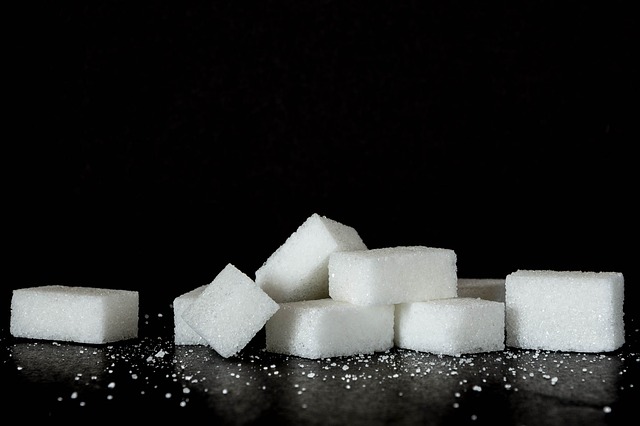We are all aware that alcohol, tobacco or caffeine are addictive but did you know that some foods can also be addictive? Clients who crave sugar often ask me if sugar is addictive.
Definition of addiction: “an addiction to something is a very strong desire or need for it” Collins dictionary. So for a food this means having a strong desire or need for it, even when you know that it is unhealthy, despite all your willpower and effort you find it hard to either reduce how much you are having or avoid it altogether.
Many of us have a sweet tooth, and enjoy a biscuit or donut at teatime or look forward to having dessert after dinner. And when we try to give these up, it is not easy, as we get uncomfortable withdrawal symptoms like headaches and crave for them.
Do we even need sugar?
Our bodies need carbohydrates, which are broken down into sugars, to create energy that we need to function. We can either have sugars which are found naturally in real foods; fruits, vegetables, beans, whole grains, etc. Or we have foods that have sugar added to them. The culprits being the processed packaged foods that tend to be a high source of sugar; obvious ones being soft drinks, chocolate, cake, ice cream, etc. But it’s also hidden in some savoury foods like tomato sauce, soup or ready-made meals.
The World Health Organisation (WHO) guideline recommends “adults and children reduce their daily intake of free sugars to less than 10% of their total energy intake. A further reduction to below 5% or roughly 25 grams (6 teaspoons) per day would provide additional health benefits.”
Why sugar is bad for you
There are many health conditions associated with consuming too much sugar and it can in the long-term cause weight gain. Overweight and obesity are linked to many chronic diseases such as Type 2 diabetes, heart disease, high blood pressure, some types of cancer, etc.
Junk foods with added processed sugar are empty calories and should be had only as a treat, in moderation. However, these one off sweet treats make us feel good after eating them. This is why we begin to need more to make us feel good and before we know, it becomes part of the daily diet.
Is sugar addictive?
The reason you may find it hard to give it up may be because sugar has addictive properties. This was shown in a study on rats in 2007, that the intense sweetness surpasses the cocaine reward.[1]
After eating foods that contain sugar the brain receives signals that activates the reward system. The neurotransmitter dopamine is released, associated with pleasure and reward.
In a study done by Princeton University it was seen that daily bingeing on sugar repeatedly, released dopamine in the accumbens shell, which is similar to what most drugs of abuse do, showing a similarity between the two as they activate the same reward systems.[2]
In a separate study, rats with intermittent access to sugar were tested for sugar dependence by testing four components of addiction; bingeing, withdrawal, craving and cross-sensitisation. It was shown that in some circumstances, rats with intermittent access to sugar can lead to behaviour and neuro chemical changes that resemble the effects of a substance of abuse. [3]
As seen in the studies above, there is evidence that supports sugar does have addictive qualities.
Do I need to give up all sugar?
We do not need to give up all sugars as we need them for energy, but need to consider the types and portions of sugars we are consuming. You can have those found in fruits, vegetables, etc. as these are real foods, which contain fibre and don’t cause a sugar rush. For example, instead of eating rich desserts have the natural sugars found in fruit or yogurt.Also, it would be better to make your own cakes, biscuits or other sweet snacks so you know exactly how much sugar you are adding in rather than buying packaged foods. Swap the white sugar for brown sugar and use less to change your palate.
So the one-off cake or ice cream is not the problem, but becomes an issue, if you crave it and are then having excessive amounts and frequently.
You then need to take control over how much sugar you are having.
Overcoming addiction to sugar is not easy but needs to be done to reduce your risk of many chronic diseases.
Let me coach you to get over your sugar cravings
Maybe you tried giving up sugar but struggled with the uncomfortable withdrawal symptoms like headaches. So, if you failed doing it on your own, I can coach you to make gradual changes so you can reduce and overcome cravings.
In my Sugar Free Challenge I show you step by step how to do this.If you crave sugar, or are having excessive amounts, you will benefit from this Sugar Cleanse Program.
CLICK HERE for more information and to join
If you have any questions send me an email at sujata@optimum-nutrition.org and look forward to guiding you in the Sugar Free Challenge.
References:
1) Lenoir M, Serre F, Cantin L, Ahmed SH. Intense sweetness surpasses cocaine reward. PLoS One. 2007 Aug 1;2(8):e698.
2) Rada P, Avena NM, Hoebel BG. Daily bingeing on sugar repeatedly releases dopamine in the accumbens shell. Neuroscience. 2005;134(3):737-44.
3) Nicole M. Avena, Pedro Rada, and Bartley G. Hoebel Evidence for sugar addiction: Behavioral and neurochemical effects of intermittent, excessive sugar intake Neurosci Biobehav Rev. 2008; 32(1): 20–39.
